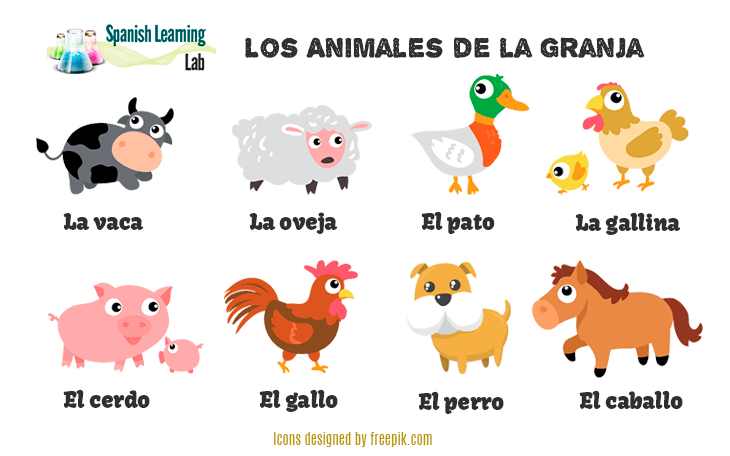¡Hola y bienvenido! In a previous lesson, we learned a bit about domestic animals and pets in Spanish. In this lesson, we will learn the most important vocabulary for farm animals in Spanish through sample sentences and by practicing with two listening activities plus interactive quizzes. We are certain that you will learn a couple of new things from this very interesting and resourceful lesson. Let’s start…

Vocabulary: A list of Farm Animals in Spanish
Before moving on to the listening activities in this lesson, it is really important that you are able to recognize the key vocabulary for this topic. Below, there is a list of farm animals in Spanish and some basic sentences using these words. Some sentences include basic adjectives to describe animals, which will be placed after nouns, for example:
- “Un cerdo gordo” (a fat pig) y “Una vaca brava“ (an angry cow)
- “Un perro juguetón” (a playful dog) y “Unas cabras ruidosas” (some noisy goats).
We will also introduce key phrases that people often use when talking about these animals, such as “producir leche” (produce milk), “revolcarse en el lodo” (wallowing in mud) and “poner huevos” (lay eggs). Notice that we used definite or indefinite articles before the name of each animal, as well as irregular verbs such as TENER and ESTAR. Pay attention to the pronunciation of each word and try to figure out the grammar behind each sentence.
|
Granja – La granja tiene muchos animales
Farm – The farm has many animals
|
|
La vaca – La vaca produce leche para alimentar a sus terneros.
The cow – The cow produces milk to feed its calves.
|
|
El buey – Los bueyes halan la carreta de un lado a otro.
The ox – The oxen pulls the cart from side to side.
|
|
La gallina – Las gallinas ponen muchos huevos a la semana.
The hen – Hens lay many eggs a week.
|
|
Los pollos – Esa gallina tiene ocho pollitos.
The chickens – That hen has eight chicks.
|
|
El gallo – El gallo canta todas la mañanas al salir el sol.
The rooster – The rooster sings every morning when the sun rises.
|
| El cerdo (formal) – Los cerdos están revolcándose en el lodo. The pig (formal) – The pigs are wallowing in mud. |
|
El chancho (informal) – Mira que gordo está ese chancho.
The pig (informal) – Look how fat that pig is.
|
|
El pato – El pato está nadando en el estanque.
The duck – The duck is swimming in the pond.
|
|
El pavo – Ese pavo es peligroso. Siempre sigue a las personas.
The turkey – That turkey is dangerous. He always chases people.
|
|
La oveja – La oveja tiene un pelaje rizado muy suave llamado lana.
The sheep – The sheep has a very soft curly coat called wool.
|
|
La cabra – Las cabras son muy ruidosas, pero su leche es muy nutritiva.
The goat – Goats are very noisy, but their milk is very nutritious.
|
|
El caballo – ¿Te gusta montar a caballo? – Si, me gusta mucho
The horse – Do you like to ride horses? – Yes, I do.
|
| El burro/asno – El burro es un animal muy terco pero muy bueno para cargar cosas. The donkey – Donkeys are a very stubborn animals, but they are very good at carrying things. |
|
El perro – El perro es el mejor amigo del hombre y el protector de la finca.
The dog – A dog is a man’s best friend and the protector of a farm.
|
|
El conejo – Los conejos se reproducen muy rápidamente.
Rabbit – Rabbits reproduce very quickly.
|
Listening Activity No. 1: Identifying Farm Animals in Spanish
Listening Activity No. 2: Talking about the animals in the farm in Spanish
Key phrases in the conversation:
- “Hace mucho calor ” means “It is really hot”
- “Voy poco a poco” means “We are moving step-by-step”
- “Nosotros podemos criar…” means “We can raise…”
Extra Practice: Spanish alphabet worksheet
Before you leave, we have created a worksheet for you to practice the alphabet in Spanish along with the vocabulary for farm animals and pets. Please follow the link and practice on your own.
Related Spanish Worksheet:
- Recognizing Wild Animals in Spanish – PDF Worksheet
- Animal Facts in Spanish – Board Game Worksheet
- Farm Animals in Spanish – PDF Word Soup